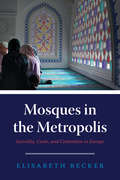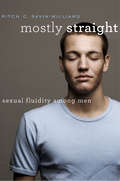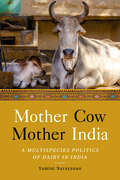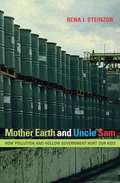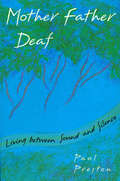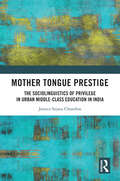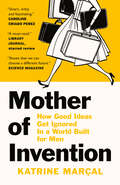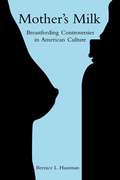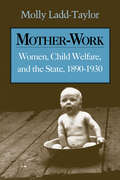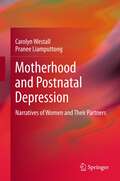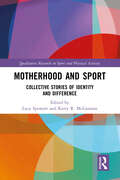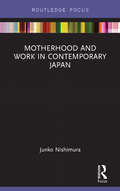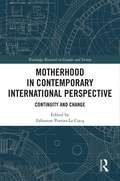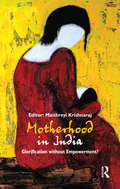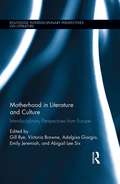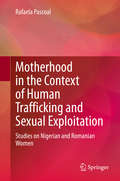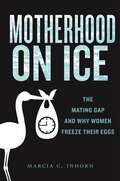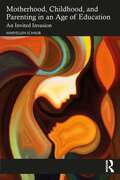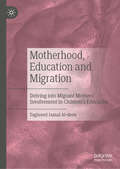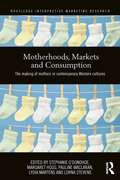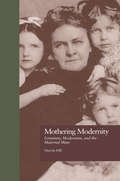- Table View
- List View
Mosques in the Metropolis: Incivility, Caste, and Contention in Europe
by Elisabeth BeckerMosques in the Metropolis offers a unique look into two of Europe’s largest mosques and the communities they support. Elisabeth Becker provides a complex picture of Islam in Europe at a particularly fraught time, shedding light on both experiences of deep and enduring marginalization and the agency of Muslim populaces. She balances individual Muslim voices with the historical and structural forces at play, revealing, in all their complexity, the people for whom the mosques are centers of religion and community life. As her interlocutors come to life in the pages, the metropolis emerges as a space alternative to the nation in which they can contend with degrading images of Islam and Muslims. Ultimately Becker insists that caste is a crucial lens through which to view Muslims in Europe, and through this lens she critiques what she perceives as the failures of European pluralism. To amplify her point, she brings Jewish history and twentieth-century Jewish thought into the conversation directly, drawing on scholars such as Walter Benjamin, Zygmunt Bauman, and Hannah Arendt to describe both Jewish and Muslim life and marginality. By challenging Eurocentric notions, from “progress” to “civility,” “tolerance” to “freedom” and “equality, what is at stake, Becker insists, is the possibility of a truly plural Europe.
Mosques in the Metropolis: Incivility, Caste, and Contention in Europe
by Elisabeth BeckerMosques in the Metropolis offers a unique look into two of Europe’s largest mosques and the communities they support. Elisabeth Becker provides a complex picture of Islam in Europe at a particularly fraught time, shedding light on both experiences of deep and enduring marginalization and the agency of Muslim populaces. She balances individual Muslim voices with the historical and structural forces at play, revealing, in all their complexity, the people for whom the mosques are centers of religion and community life. As her interlocutors come to life in the pages, the metropolis emerges as a space alternative to the nation in which they can contend with degrading images of Islam and Muslims. Ultimately Becker insists that caste is a crucial lens through which to view Muslims in Europe, and through this lens she critiques what she perceives as the failures of European pluralism. To amplify her point, she brings Jewish history and twentieth-century Jewish thought into the conversation directly, drawing on scholars such as Walter Benjamin, Zygmunt Bauman, and Hannah Arendt to describe both Jewish and Muslim life and marginality. By challenging Eurocentric notions, from “progress” to “civility,” “tolerance” to “freedom” and “equality, what is at stake, Becker insists, is the possibility of a truly plural Europe.
Mosques in the Metropolis: Incivility, Caste, and Contention in Europe
by Elisabeth BeckerMosques in the Metropolis offers a unique look into two of Europe’s largest mosques and the communities they support. Elisabeth Becker provides a complex picture of Islam in Europe at a particularly fraught time, shedding light on both experiences of deep and enduring marginalization and the agency of Muslim populaces. She balances individual Muslim voices with the historical and structural forces at play, revealing, in all their complexity, the people for whom the mosques are centers of religion and community life. As her interlocutors come to life in the pages, the metropolis emerges as a space alternative to the nation in which they can contend with degrading images of Islam and Muslims. Ultimately Becker insists that caste is a crucial lens through which to view Muslims in Europe, and through this lens she critiques what she perceives as the failures of European pluralism. To amplify her point, she brings Jewish history and twentieth-century Jewish thought into the conversation directly, drawing on scholars such as Walter Benjamin, Zygmunt Bauman, and Hannah Arendt to describe both Jewish and Muslim life and marginality. By challenging Eurocentric notions, from “progress” to “civility,” “tolerance” to “freedom” and “equality, what is at stake, Becker insists, is the possibility of a truly plural Europe.
Mostly Straight: Sexual Fluidity among Men
by Ritch C. Savin-WilliamsA growing number of young men today say they are “mostly straight” and yet feel a slight but enduring desire for men. Ritch Savin-Williams explores the stories of 40 mostly straight young men to help us understand the biological, psychological, and cultural forces that are loosening the sexual bind many boys and young men experience.
Mother Cow, Mother India: A Multispecies Politics of Dairy in India (South Asia in Motion)
by Yamini NarayananIndia imposes stringent criminal penalties, including life imprisonment in some states, for cow slaughter, based on a Hindu ethic of revering the cow as sacred. And yet India is among the world's leading producers of beef, leather, and milk, industries sustained by the mass slaughter of bovines. What is behind this seeming contradiction? What do bovines, deemed holy in Hinduism, experience in the Indian milk and beef industries? Yamini Narayanan asks and answers these questions, introducing cows and buffaloes as key subjects in India's cow protectionism, rather than their treatment hitherto as mere objects of political analysis. Emphasizing human–animal hierarchical relations, Narayanan argues that the Hindu framing of the cow as "mother" is one of human domination, wherein bovine motherhood is simultaneously capitalized for dairy production and weaponized by right-wing Hindu nationalists to violently oppress Muslims and Dalits. Using ethnographic and empirical data gathered across India, this book reveals the harms caused to buffaloes, cows, bulls, and calves in dairying, and the exploitation required of the diverse, racialized labor throughout India's dairy production continuum to obscure such violence. Ultimately, Narayanan traces how the unraveling of human domination and exploitation of farmed animals is integral to progressive multispecies democratic politics, speculating on the real possibility of a post-dairy society, based on vegan agricultural policies for livelihoods and food security.
Mother Earth and Uncle Sam
by Rena I. SteinzorIn this compelling study, Rena Steinzor highlights the ways in which the government, over the past twenty years, has failed to protect children from harm caused by toxic chemicals. She believes these failures--under-funding, excessive and misguided use of cost/benefit analysis, distortion of science, and devolution of regulatory authority--have produced a situation in which harm that could be reduced or eliminated instead persists. Steinzor states that, as a society, we are neglecting our children's health to an extent that we would find unthinkable as individual parents, primarily due to the erosion of the government's role in protecting public health and the environment. At this pace, she asserts, our children will inherit a planet under grave threat. We can arrest these developments if a critical mass of Americans become convinced that these problems are urgent and the solutions are near at hand. By focusing on three specific case studies--mercury contamination through the human food chain, perchlorate (rocket fuel) in drinking water, and the effects of ozone (smog) on children playing outdoors--Steinzor creates an analysis grounded in law, economics, and science to prove her assertions about the existing dysfunctional system. Steinzor then recommends a concise and realistic series of reforms that could reverse these detrimental trends and serve as a blueprint for restoring effective governmental intervention. She argues that these recommendations offer enough material to guide government officials and advocacy groups toward prompt implementation, for the sake of America's--and the world's--future generations.
Mother Father Deaf: Living Between Sound and Silence
by Paul Preston“Mother father deaf” is the phrase commonly used within the Deaf community to refer to hearing children of deaf parents. These children grow up between two cultures, the Hearing and the Deaf, forever balancing the worlds of sound and silence. Paul Preston, one of these children, takes us to the place where Deaf and Hearing cultures meet, where families like his own embody the conflicts and resolutions of two often opposing world views. Based on 150 interviews with adult hearing children of deaf parents throughout the United States, Mother Father Deaf examines the process of assimilation and cultural affiliation among a population whose lives incorporate the paradox of being culturally “Deaf” yet functionally hearing. It is rich in anecdote and analysis, remarkable for its insights into a family life normally closed to outsiders.
Mother India's Children: Meeting Today's Generation in India
by Edward RiceYoga, books of meditation and the music of India are becoming increasingly popular in the United States, particularly among young people. To discover how young people who have lived within this other culture think, Edward Rice, the author and photographer of this book, spent time in India talking with teenagers. In these "interviews" -cool, casual raps by a gifted observer -the author asked all kinds of questions, and came up with an intense and personal portrait of a country; revealed with an immediacy and intimacy that will surprise most American readers, on either side of the generation gap. TRADITIONAL INDIA A young Muslim girl, almost too shy to speak; a Brahmin wife, married at 14; a teenage guru fast becoming an expert on the 4,000 year old prayers and chants taught by the Vedas. BIG CITY INDIA Upper class teenage rebels, office workers, students, young Sikhs and Parsis: castes and classes juggled together in crowded cities. CHANGING INDIA A Muslim girl who defies tradition by entering a beauty contest-and wins; an elephant boy from the jungles; students in villages and towns trying to find a balance between India's past and India's present. People talking, people walking, people caught by the special magic in a photograph; a time and culture at once summed up and left mysterious: Mother India's Children.
Mother Tongue Prestige: The Sociolinguistics of Privilege in Urban Middle-Class Education in India
by Jessica Sujata ChandrasThis book studies the intersection of language and social privilege in education in India. Drawing on rich ethnographic detail and primary data, it introduces a conversation of privilege, specifically contemporary configurations of caste and socioeconomic class in India, to the fields of South Asian studies and sociolinguistic educational studies. The author examines how and why education at the pre-primary, secondary, and higher education levels in India remains largely segregated by socioeconomic class and caste through the lens of language. She advances fields of study of multilingual education, language ideologies, and complexities between language and identity to contribute to work on language and privilege in education by providing a novel and contemporary case from India. The book also critiques contemporary caste configurations in India that uphold urban middle-class Brahmins as the socially privileged purveyors of social and linguistic norms. Mother Tongue Prestige parses out threads of motivation, perceptions of education, and aspirations tied to language use and learning that shape generations of students in an educational system preparing them for a globalized workforce and urban, multilingual livelihoods in India and abroad. It will be indispensable for students and researchers of education, language, sociology, sociology of education, linguistics, sociolinguistics, South Asian studies.
Mother of Invention: How Good Ideas Get Ignored in an Economy Built for Men
by Katrine MarcalAn illuminating and maddening examination of how gender bias has skewed innovation, technology, history and work.It all starts with a rolling suitcase. The wheel was invented some 5,000 years ago, and the modern suitcase in the mid-nineteenth century, but it wasn&’t until the 1970s that someone successfully married the two. What was the hold up? For writer and journalist Katrine Marçal, the answer is both shocking and simple: because "real men" carried their bags, no matter how heavy. There were rolling suitcases before the '70s, but they were marketed as a niche product for (the presumably few) women travelling alone, and the wheeled suitcase wasn't "invented" until it was no longer threatening to masculinity. Mother of Invention draws on this example and many others, from electric cars to tech billionaires, to show how gender bias stifles the economy and holds us back. Our traditional notions about men and women have delayed innovations, sometimes by hundreds of years, and have distorted our understanding of our history. While we talk about the Iron Age and the Bronze Age, we might as well talk about the Ceramic Age or the Flax Age, since these technologies were just as important. But inventions associated with women are not considered to be technology in the same way. Katrine Marçal&’s Mother of Invention is a fascinating examination of business, technology, and innovation through a feminist lens. Marçal takes us on a tour of the global economy, arguing that gendered assumptions dictate which businesses get funding, how we value work, and how we trace human progress. And it carries a powerful message: If we upend our biases, we can unleash our full potential, tackling climate change and wielding technology to become more human, rather than less.
Mother's Milk: Breastfeeding Controversies in American Culture
by Bernice L. HausmanMother's Milk examines why nursing a baby is an ideologically charged experience in contemporary culture. Drawing upon medical studies, feminist scholarship, anthropological literature, and an intimate knowledge of breastfeeding itself, Bernice Hausman demonstrates what is at stake in mothers' infant feeding choices--economically, socially, and in terms of women's rights. Breastfeeding controversies, she argues, reveal social tensions around the meaning of women's bodies, the authority of science, and the value of maternity in American culture. A provocative and multi-faceted work, Mother's Milk will be of interest to anyone concerned with the politics of women's embodiment.
Mother-Work: Women, Child Welfare, and the State, 1890-1930 (Women, Gender, and Sexuality in American History)
by Molly Ladd-TaylorEarly in the twentieth century, maternal and child welfare evolved from a private family responsibility into a matter of national policy. Molly Ladd-Taylor explores both the private and public aspects of child-rearing, using the relationship between them to cast new light on the histories of motherhood, the welfare state, and women's activism in the United States. Ladd-Taylor argues that mother-work, "women's unpaid work of reproduction and caregiving," motivated women's public activism and "maternalist" ideology. Mothering experiences led women to become active in the development of public health, education, and welfare services. In turn, the advent of these services altered mothering in many ways, including the reduction of the infant mortality rate.
Motherhood and Postnatal Depression
by Pranee Liamputtong Carolyn WestallGlobally, postnatal depression (PND) is a growing public health problem. PND affects 10 to 15% of women in Western society. It caused by a combination of biological, psychological and social factors. Two models have attempted to define and explain PND; the biomedical and the sociological models. The traditional biomedical model views PND as a medical condition which implies there is individual pathology and abnormality. Whilst the biomedical model has been the dominant model in treating PND, it has been criticized by feminist sociologists and psychologists for its rigidity in defining and explaining PND. In contrast, the psychosocial model of health acknowledges the biological factors that impact on emotional well-being, but places more emphasis on the personal and social factors that impact on emotional well-being, but places more emphasis on the personal and social factors that contribute to depressive symptoms such as gender, poverty, social disadvantage and social class. The central argument throughout this book is the importance of support before and after the birth for women's emotional well-being. This book will also include women's journeys through pregnancy, childbirth, motherhood, postnatal depression, and resolution. To date, literature has focused on women's lived experiences of PND rather than their personal journeys through pregnancy, childbirth and early motherhood. Additionally, the adjustment to fatherhood has received less attention. For example, little is known about the impact of postnatal depression on the partner, what support partners offer when women with the intention to fill the gap in knowledge of cultural and social issues relating to pregnancy, childbirth, and motherhood for woman who were diagnosed with, and had resolved, PND.
Motherhood and Sport: Collective Stories of Identity and Difference (Qualitative Research in Sport and Physical Activity)
by Lucy SpowartAlthough sport participation decreases on average for women once they become mothers, female athletes from the recreational, to the competitive, to the elite level have demonstrated that motherhood does not signal the end of sport engagement and athletic identities, or career and leadership roles. This is the first book to offer an in-depth examination of the nexus of women, sport and culture within the context of motherhood, uncovering new narratives that raise the profile of non-conformist performances. The book brings together international researchers using innovative and rigorous qualitative methods to show how sport affords or constrains women’s agency to devise, negotiate and live alternative versions of motherhood in and through sport. Presenting stories of sporting mothers in contexts including martial arts, leisure swimming, recreational running, triathlon and climbing, the book explores the shifting meaning and practices of motherhood across social, cultural and media/digital landscapes. Deliberately challenging taken-for-granted ways of thinking about motherhood and sport, this book is fascinating reading for anybody with an interest in the socio-cultural study of sport, gender and sport, women’s studies, sport coaching, sport leadership, sport development, or qualitative and digital research methods.
Motherhood and Work in Contemporary Japan (Routledge Research on Gender in Asia Series)
by Nishimura JunkoThis book explores the employment of Japanese women born in the 1960s and 1970s who experienced childbirth and raised children in the 1990s and the early 2000s. During this period, the Japanese economy experienced a severe recession. It has affected the firm-specific internal labour market and on employment practices, which in turn are thought to have greatly influenced Japanese women’s employment. On the other hand, the fertility rate declined and social policies to support women’s employment began to be implemented after the 1990s. <P><P>This book explores how these labour market structure and social policies interact to affect Japanese women’s employment. The book first analyses the employment patterns of women born between the 1920s and 1970s and examines how they have varied among different birth cohorts. Then, the employment behaviour of women before and after childbirth through the post-child-rearing period, as well as the working career of single mothers are explored for women born in the 1960s and 1970s. Based on the data analyses, the concluding part of this book discusses how the labour market structure and social policies during the 1990s and early 2000s interactively influenced employment behaviour of Japanese women, and some suggestions are put forward for changing women’s employment during the child-rearing years.
Motherhood in Contemporary International Perspective: Continuity and Change (Routledge Research in Gender and Society)
by Fabienne Portier-Le CocqDivided into 15 chapters, this book provides the reader with an insight into certain representations of mothers and motherhood in history and today’s societies in some areas of the world, notably in Britain and Asia. Key facts about the history of motherhood are presented, together with the use of very recent notions and phrases portraying ‘good’ and ‘bad’ mothers. An analysis of the concepts of naming and blaming, along with regret with respect to mothers in 21st century societies, provides food for thought. Other issues addressed are varied and numerous: the politics of early intervention, feminist critique, mothers with disabilities and mothers of disabled children, incarcerated mothers, surrogate mothers, teenage mothers, lesbian mothers, and mothering in Eastern Asia, namely in China, Japan, and Korea. Interestingly, both visual arts and literature play a crucial role in this analysis. The publication will appeal to students, academics, researchers, and the general public interested in and seeking to comprehend the shifts that have occurred over time in connection with the vast and inexhaustible subject of motherhood and mothers – a private and public matter. Readers are also provided with a rich reference section dealing with the latest publications on the issues tackled by prominent academics and researchers in human geography, women’s studies, sociology, gender studies, contemporary history, and the arts.
Motherhood in India: Glorification without Empowerment?
by Maithreyi KrishnarajThis book presents an overview of the varied experiences and representations of motherhood in India from ancient to modern times. The thrust of the arguments made by the various contributors is that the centrality of motherhood as an ideology in a woman’s life is manufactured. This is demonstrated by analysing various institutional structures of society – language, religion, media, law and technology. The articles in this book are chronologically arranged, tracing the different stages that motherhood as a concept has traversed in India – from goddess worship to nationalism, to being a vehicle of reproduction of the sexual division of labour and the inheritance of property via the male-line. Underlying these stages are the dialectics between them that have been facilitated by agents such as the state – the ultimate controller of a woman’s reproductive powers. The feminist critique of ‘essentialising’ the role of a woman has been employed to deconstruct and humanise the experiences and lives of mothers. This anthology therefore attempts to initiate a meaningful and ‘sensitive’ engagement with issues pertaining to a woman’s autonomy over her body and her role also as a mother.
Motherhood in Literature and Culture: Interdisciplinary Perspectives from Europe (Routledge Interdisciplinary Perspectives on Literature)
by Victoria Browne Abigail Lee Six Gill Rye Adalgisa Giorgio Emily JeremiahMotherhood remains a complex and contested issue in feminist research as well as public discussion. This interdisciplinary volume explores cultural representations of motherhood in various contemporary European contexts, including France, Italy, Germany, Portugal, Spain, and the UK, and it considers how such representations affect the ways in which different individuals and groups negotiate motherhood as both institution and lived experience. It has a particular focus on literature, but it also includes essays that examine representations of motherhood in philosophy, art, social policy, and film. The book’s driving contention is that, through intersecting with other fields and disciplines, literature and the study of literature have an important role to play in nuancing dialogues around motherhood, by offering challenging insights and imaginative responses to complex problems and experiences. This is demonstrated throughout the volume, which covers a range of topics including: discursive and visual depictions of pregnancy and birth; the impact of new reproductive technologies on changing family configurations; the relationship between mothering and citizenship; the shaping of policy imperatives regarding mothering and disability; and the difficult realities of miscarriage, child death, violence, and infanticide. The collection expands and complicates hegemonic notions of motherhood, as the authors map and analyse shifting conceptions of maternal subjectivity and embodiment, explore some of the constraining and/or enabling contexts in which mothering takes place, and ask searching questions about what it means to be a ‘mother’ in Europe today. It will be of interest not only to those working in gender, women’s and feminist studies, but also to scholars in literary and cultural studies, and those researching in sociology, criminology, politics, psychology, medical ethics, midwifery, and related fields.
Motherhood in the Context of Human Trafficking and Sexual Exploitation: Studies on Nigerian and Romanian Women
by Rafaela PascoalThis book discusses motherhood of Nigerian and Romanian women in Italy and Romania, who are human trafficking victims for sexual purposes. It provides a broad gender approach to emerge on the phenomenon of human trafficking with an analytic perspective of all the social, cultural, legal and economic components that play an important role during all phases of motherhood. The book compares the motherhood of these two nationalities within a context of an illegal/legal status in the European territory. It reflects on the used terms of vulnerability, sexual exploitation, victim, resistance and resilience. This book enlightens scholars and students with a broad perspective on this complex phenomenon, understanding the intersectionality of the victims’ features and its relation with the several push and pull factors that lead a human trafficking victim into vulnerability, resistance and resilience.
Motherhood on Ice: The Mating Gap and Why Women Freeze Their Eggs (Anthropologies of American Medicine: Culture, Power, and Practice #10)
by Marcia C. InhornAnswers the question: Why are women freezing their eggs?Why are women freezing their eggs in record numbers? Motherhood on Ice explores this question by drawing on the stories of more than 150 women who pursued fertility preservation technology. Moving between narratives of pain and empowerment, these nuanced personal stories reveal the complexity of women’s lives as they struggle to preserve and extend their fertility. Contrary to popular belief, egg freezing is rarely about women postponing fertility for the sake of their careers. Rather, the most-educated women are increasingly forced to delay childbearing because they face a mating gap—a lack of eligible, educated, equal partners ready for marriage and parenthood. For these women, egg freezing is a reproductive backstop, a technological attempt to bridge the gap while waiting for the right partner. But it is not an easy choice for most. Their stories reveal the extent to which it is logistically complicated, physically taxing, financially demanding, emotionally draining, and uncertain in its effects. In this powerful book, women share their reflections on their clinical encounters, as well as the immense hopes and investments they place in this high-tech fertility preservation strategy. Race, religion, and the role of men in the lives of single women pursuing this technology are also explored. A distinctly human portrait of an understudied and rapidly growing population, Motherhood on Ice examines what is at stake for women who take comfort in their frozen eggs while embarking on their quests for partnership, pregnancy, and parenting.
Motherhood, Childhood, and Parenting in an Age of Education: An Invited Invasion
by Maryellen SchaubMotherhood, as a celebrated yet underappreciated role, is often thought of as a natural process, something instinctive that we refine by watching our own mothers and others in our community. We rarely think of motherhood as something that is time and culturally specific, yet, like culture itself, it is socially constructed, and both motherhood and childhood evolve over time. With the rise in educational attainment of mothers in the American population, the expectations associated with childhood increasingly include not just education but cognitive development and extracurricular activities as the partnership between parents and education intensifies in the joint project of human development of children. Motherhood, Childhood, and Parenting in an Age of Education offers a new way to conceptualize the high demands of contemporary parenthood. It traces the emerging narrative about the "good mother," changes in the underlying assumptions of what constitutes the "good mother," and the implications for the "good childhood" as education grows in institutional strength. This book demonstrates that education is driving the formation of the parent and child roles in the dominant contemporary culture of the US although alternate models exist. Education itself has expanded over time to become our largest social intervention, defining behaviors and beliefs such as parental involvement in schooling, the unengaged parent, and the deficient student.
Motherhood, Childhood, and Parenting in an Age of Education: An Invited Invasion
by Maryellen SchaubMotherhood, as a celebrated yet underappreciated role, is often thought of as a natural process, something instinctive that we refine by watching our own mothers and others in our community. We rarely think of motherhood as something that is time and culturally specific, yet, like culture itself, it is socially constructed, and both motherhood and childhood evolve over time. With the rise in educational attainment of mothers in the American population, the expectations associated with childhood increasingly include not just education but cognitive development and extracurricular activities as the partnership between parents and education intensifies in the joint project of human development of children. Motherhood, Childhood, and Parenting in an Age of Education offers a new way to conceptualize the high demands of contemporary parenthood. It traces the emerging narrative about the "good mother," changes in the underlying assumptions of what constitutes the "good mother," and the implications for the "good childhood" as education grows in institutional strength. This book demonstrates that education is driving the formation of the parent and child roles in the dominant contemporary culture of the US although alternate models exist. Education itself has expanded over time to become our largest social intervention, defining behaviors and beliefs such as parental involvement in schooling, the unengaged parent, and the deficient student.
Motherhood, Education and Migration: Delving into Migrant Mothers’ Involvement in Children’s Education
by Taghreed Jamal Al-deenThis book draws together analysis of class, gender, ethnicity and processes of migration in the context of family-school relationships. It provides an original analysis of the role of class as gendered and ethnicised in the explanation of the reproduction of educational inequalities. This book’s analysis of class is developed through insights into how class, gender, ethnicity and religion are interrelated and connected to patterns of advantages and disadvantages in transnational flows. It explores parental involvement in children’s education in the migratory context as a key site for the analysis of social class positioning and repositioning, focusing on a group of migrant Muslim mothers living in Australia. This book sheds lights on the interconnection of class, gender, ethnicity and religion embedded in migrant mothers’ lives and the roles of these facets in regard to the education of their children. Delving into Muslim migrant mothers’ practices and beliefs concerning their involvement provides new understanding of how support of children’s education is shaped by the process of migration along with the neoliberal reforms of education systems and in particular repositioning of social class.
Motherhoods, Markets and Consumption: The Making of Mothers in Contemporary Western Cultures (Routledge Interpretive Marketing Research)
by Pauline Maclaran Lydia Martens Stephanie O'Donohoe Margaret Hogg Lorna StevensIt takes more than a baby to make a mother, and mothers make more than babies. Bringing together a range of international studies, Motherhoods, Markets and Consumption examines how marketing and consumer culture constructs particular images of what mothers are, what they should care about and how they should behave; exploring how women's use of consumer goods and services shapes how they mother as well as how they are seen and judged by others. Combining personal accounts from many mothers with different theoretical perspectives, this book explores: How advertising, media and consumer culture contribute to myths and stereotypes concerning good and bad mothers How particular consumer choices are bound up with women’s identities as mothers The role of consumption for women entering different phases of their mothering lives: such as pregnancy, early motherhood, and the "empty nest"
Mothering Modernity: Feminism, Modernism, and the Maternal Muse (Origins of Modernism)
by Marylu HillFirst published in 1999. Routledge is an imprint of Taylor & Francis, an informa company.
